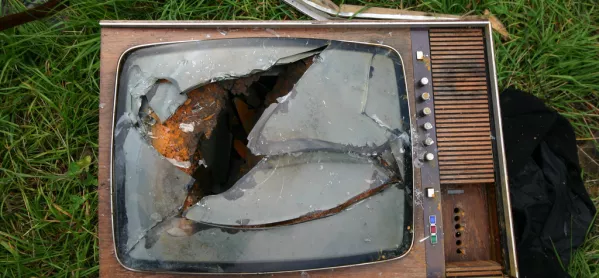The BBC was created to inform, entertain and to educate. Good programmes on schools (and universities) achieve all three. But they are thin on the ground.
The BBC is a superb organisation, the best broadcaster in the world. But, it has to be said, its attitude to school and university content is patronising and unimaginative. Education programmes have all but disappeared from the radio, while on television the diet almost degrades schools and the teaching profession, rather than inspiring and stimulating. Where are the programmes like Educating Greater Manchester, now being shown on Channel 4, which also gave us the award-winning Educating Essex and Educating Yorkshire?. Tough Young Teachers, made by Victory Television and supported by Teach First, made for superb television but it was aired only on BBC Three in 2014.
All listeners and viewers have participated in education and the great majority of older viewers will have children or grandchildren who are going through it or have recently been in it. Few topics are as fascinating, fast-changing or controversial as education. Most conversations come around to it sooner or later, once politics and Brexit are exhausted. Everyone has an opinion on education. The BBC pumps out glorious content on so many subjects.Yet on education?
It wasn’t always like this. BBC Education for many years offered a rich diet of programmes on the radio and television, but the serious content has been run down. BBC executives give a clear impression that they find schools boring. How often have they invited teachers to appear on Radio 4’s Any Questions, or BBC One’s Question Time? The BBC is not alone, of course, in being dismissive of teachers. We battle to be taken as seriously as other professions.
‘British education is a national treasure’
Britain’s top universities and schools rank among the best in the world. Students from across the globe flock to the UK, knowing that the education they will receive will be transformative. You wouldn’t think that British education is a national treasure, judging by the BBC’s approach - a contrast to the way the BBC treats our culture. We have wonderful programmes featuring and analysing our cultural achievement at its best. However, where are the comparable programmes on British education?
For 10 years, Radio 4 ran a programme chaired by Libby Purves called The Learning Curve, covering all aspects of education. When it was stopped in November 2008, undertakings were given that alternative programmes would be offered. None were. Other promises have been made that education will be given a far more serious place on the airwaves, but nothing substantial is forthcoming. Former Labour minister James Purnell oversees education at the BBC and has the imagination and influence to utterly transform the picture. But will he?
Radio 4 has regular programmes on a whole variety of topics, including politics, business, international affairs, law, finance, farming, health and the arts. Why not have a regular spot for exploring current issues in education? The Learning Curve could be brought back in another guise. Cheekily, I would suggest Mary Curnock Cook, former Ucas supremo, as the anchor.
We have a national shortage of good people entering and remaining in the profession. No one expects the BBC to be waving the flag for teaching. Yet quality dramas and current affairs programmes, alongside a deeper treatment of education in news programmes, would give a fairer reflection of the extraordinary work happening day by day across our education system. This might inspire more people to see that this is a profession as worthwhile as medicine in which to spend their careers.
The BBC must put serious money and serious talent into designing high-quality television and radio programmes, which discuss, analyse and challenge schools and universities. Once it does so, it will not only educate the nation better, it will also inform and entertain it as well with glorious and rich content.
Sir Anthony Seldon is vice-chancellor of the University of Buckingham, and a former master of Wellington School
Want to keep up with the latest education news and opinion? Follow Tes on Twitter and like Tes on Facebook



